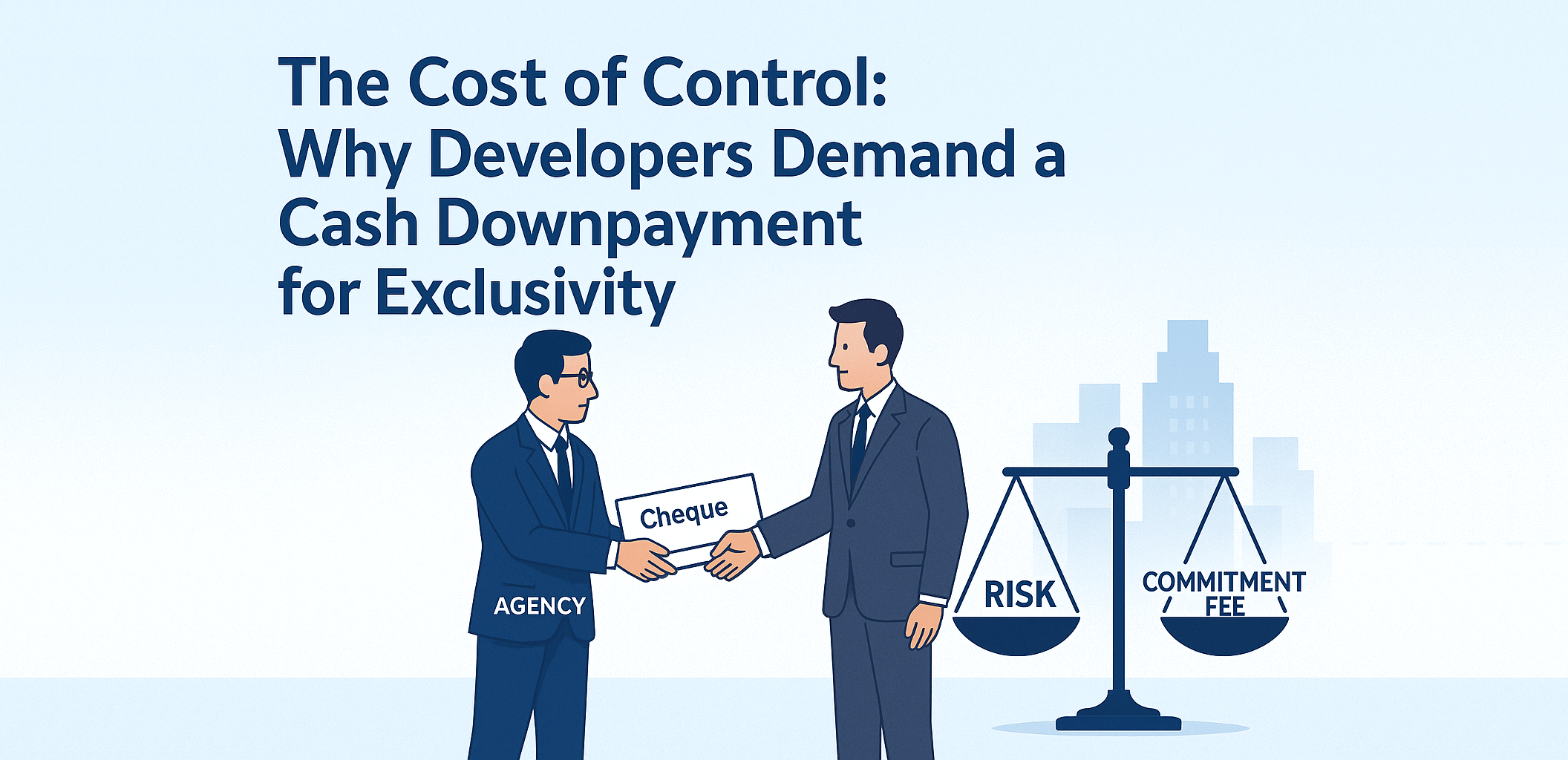The Cost of Control: Why Developers Demand a Cash Downpayment for Exclusivity

Securing an exclusive project is the ultimate win for an agency: total control, no price wars, and a guaranteed commission pipeline.
But this privilege is rarely free. Modern developers now demand a non-refundable Commitment Fee or downpayment—often ranging from RM500,000 to RM1 million—to secure exclusive sales rights to a block of units.
The fee is conditional: refunded or credited only if you hit the aggressive sales targets. Failure means forfeiture.
On the surface, this looks like a straightforward performance guarantee. But the developer isn't just securing sales; they are executing a strategic maneuver to offload their own commercial risk.
Here’s why developers demand your cash—and why you become the principal risk holder.
1. The Real Reason: The Fee is Insurance, Not Revenue
A large developer does not require your agency's RM1 million to fund construction. Their need is not for cash, but for Certainty and Velocity.
When a developer grants exclusivity over a large block (e.g., 100 units), they are surrendering every alternative sales channel. If your agency then fails to sell, the developer loses critical time, momentum, and market share.
The commitment fee is a behavioral contract designed to ensure you mobilize fully:
- Forced Urgency: Your own capital being locked up compels you to dedicate maximum manpower and co-broking resources until the block is cleared.
- Risk Transfer: The developer limits their risk exposure to the time the units are blocked. Your agency assumes the financial risk of failure-to-perform.
The fee is not intended as profit; it is a cheap, effective insurance policy against your agency's underperformance.
2. Market Sickness: The Collapse of Trust
Why demand a deposit from an agency with a proven track record? Because trust in the sales ecosystem has collapsed.
Developers have been burned too many times by agencies who:
- Hoard Inventory: Secure exclusivity, then simply sit on the units, passively waiting for walk-ins.
- Block Channels: Prevent co-broking, artificially restricting market exposure.
- Kill Momentum: Allow valuable launch time to expire when units age.
Now, even highly capable agencies are forced to put skin in the game. If your reputation alone cannot guarantee performance, your cash will. For the vast majority of agencies, the initial cheque serves as the only evidence of their commitment.
3. The Dangerous Flip: You Become the Principal Risk Investor
This model is deeply seductive—until the project hits turbulence. By paying the fee, you are paying upfront for something you have no control over: the developer’s execution.
Your agency is now exposed to non-sales risks:
- Developer Incompetence: Project delays, loss of APDL, or regulatory stoppage.
- Market Shift: A sudden change in interest rates or government policy that kills demand.
- Financial Distress: The developer pauses or enters insolvency.
Your risk is not limited to the forfeited commitment fee. You lose: Your cash, months of manpower, agent morale, and the commission pipeline that was supposed to fund your growth.
Legally, recovering a commitment fee from an insolvent or pausing developer is nearly impossible. The developer's risk is limited to time and market optics. Your risk is cash, credibility, and career capital.
4. The Smarter Strategy: Commit Buyers, Not Money
The objective is to secure exclusivity without becoming the developer’s involuntary bank. The smarter strategy is to reverse the risk sequence by building demand leverage:
- Aggregate Demand: Pre-qualify and gather a substantial block of ready-to-book purchasers.
- Present Guaranteed Take-Up: Approach the developer with a pipeline of guaranteed commitment, proven by real, imminent buyer interest.
- Negotiate: Demand soft exclusivity or bulk pricing concessions based on the proven demand you bring.
In this model, you commit your market reach and sales velocity, not your cash liquidity. It’s cleaner, safer, and builds your reputation as a true deal originator, not a high-risk gambler.
Final Verdict: Liquidity is Survival
The commitment fee system is a commercial reaction to agency underperformance. But the agency's primary survival tool is liquidity.
If your agency has consistent velocity, use your track record to negotiate exclusivity without prepayment.
If you cannot negotiate the fee away, focus on building buyer-backed leverage first.
Do not confuse a high-pressure demand for cash with real sales leverage. In the pursuit of exclusivity, control is power—but maintaining liquidity is survival. Commit to performance, not prepayment.











































































































